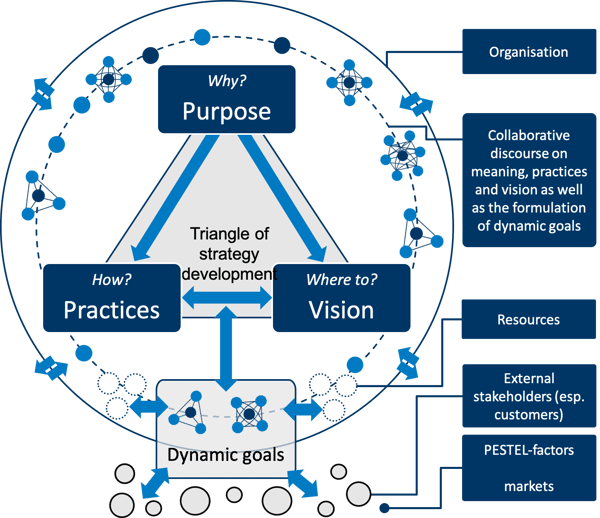"Purpose" - the fundamental power of a healthy organization
What is the meaning of the question "why" in the VUCA world?
In the development of every healthy person, the question of why arises at some point in life. Parents know this question of their toddler only too well. Some twist their eyes, others take their time to answer the why for the pupil. In today's world of work, however, this question is no less important to many adults than it is to infants.
What is the purpose of my job? Why does this company exist? What is the aim of this organisation? Organisations that can provide answers to these questions belong to the future.
While profit maximization was the highest maxim until the 90s and 2000s, companies today dedicate themselves to an overarching purpose that serves society - and make corporate purposes such as "turnover" or "profit" into downstream vicarious agents.
According to Veken (2015), the sense of enterprise expresses the inner concern of the organisation and describes the endeavour to change the world beyond economic goals. Participating in the sense of enterprise makes work seem special to employees.
What is the reason for your company's existence? What would society lack if your organization did not do what it does? What is its "purpose"?
The importance for change management
Especially in change processes, organizations need "Purpose" to underpin change with a higher purpose and deeper meaning.
Changes and innovations are initially met with mistrust instead of seeing them as an opportunity. Known things are changed and man is a creature of habit.
In this way, an ordered "change" from the top of the management floor is hardly carried internally by the workforce. It is different when it becomes clear to the employees why a change is necessary and sensible.
In order to become fair the existence reason and its sense, the enterprise is on a continual journey and transforms itself ever further.
The organization has an overarching goal based on a common purpose, which is ethically, morally and socially convincing and is the force that sustains the economic progress of the organization.
Ask yourself the following questions: Who are we? What was our founding purpose? What is our DNA? What is our core of values?
The importance for employer attractiveness
The mediation of "Purpose" causes identification inside the organization and creates an award and distinction to the outside world. In order to increase the attractiveness of the employer, exactly these two aspects are decisive.
It is therefore the task of organizational developers and managers in companies to make the sense of their company clear, to take employees with them, and to tell the environment why they are doing what they are doing and what it means for society.
Talking about it alone does not do much good. You are quickly judged by what you pretend to be.
So ask yourself: How can we ensure that we actually keep our value proposition in everyday life? To what extent are we prepared to give up a "cash cow" in order not to look like hypocrites?
The importance for the strategy
In addition to answering the "Why" question, the questions of how and where to go will also have to be clarified. However, these are dependent on the question of meaning - the why. Without this "Know-Why" no consistent work is possible.
A successful strategy is based on the "Purpose". A sense-oriented perspective in the organization is therefore a decisive aspect for success, because only then can the right strategy for the organization be developed.
Healthy companies act on the basis of their purpose and can therefore react quickly to the requirements of the VUCA world. Not because new techniques and training lead to it, but because the goal is not lost sight of and despite great challenges one knows what one's raison d'être is.
The following questions arise: What would our stakeholders have to do without if our labour supply, products and services no longer existed? Which concerns, needs and problems would remain unsolved?

Significance for EBIT
The world is not black or white, with or without meaning, profit-oriented or detached from economic constraints.
Nevertheless, there are interesting figures that show surprisingly clearly how successfully meaningful companies perform economically in comparison to their competitors. According to a global survey conducted by EY (formerly Ernst & Young) in collaboration with Harvard Business Review on the basis of 474 participating companies, the following interrelationships were identified:
- Outperformance of the S & P (1996-2011) of meaningful companies by a factor of 10
- 58% of means-led companies have an increase of at least 10% compared to non-s means-led companies (2012-2015)
- Employees are 1.7 times more satisfied with their job
- It is 3x more likely that employees will stay with their company
- 89% of customers say that they believe that a meaningful company offers the highest quality products and services
- 84% of executives surveyed assume that companies with a common purpose are more successful in transformation projects
Conclusion
Companies should be able to recognise or at least assess their original purpose. The "Know-Why" is the most important priority in the daily work, not only in the strategy development. The existence of the company is justified by the sense of enterprise. Purpose" is therefore by far the most important factor for the establishment and further development of a healthy, successful company.
Literature:
Claßen, M. & von Kyaw, Felicitas (2018). Purpose: About the sense and purpose. chaangement! Issue 06/2018
Kallenbach, Ingo (2016). Leadership in a Healthy Organization. Exceptional performance through potential development. Stuttgart: Schäffer-Poeschel.
Veken, D. (2015). The purpose of the company. What do we actually work for? Hamburg: Murmann Publishers.

